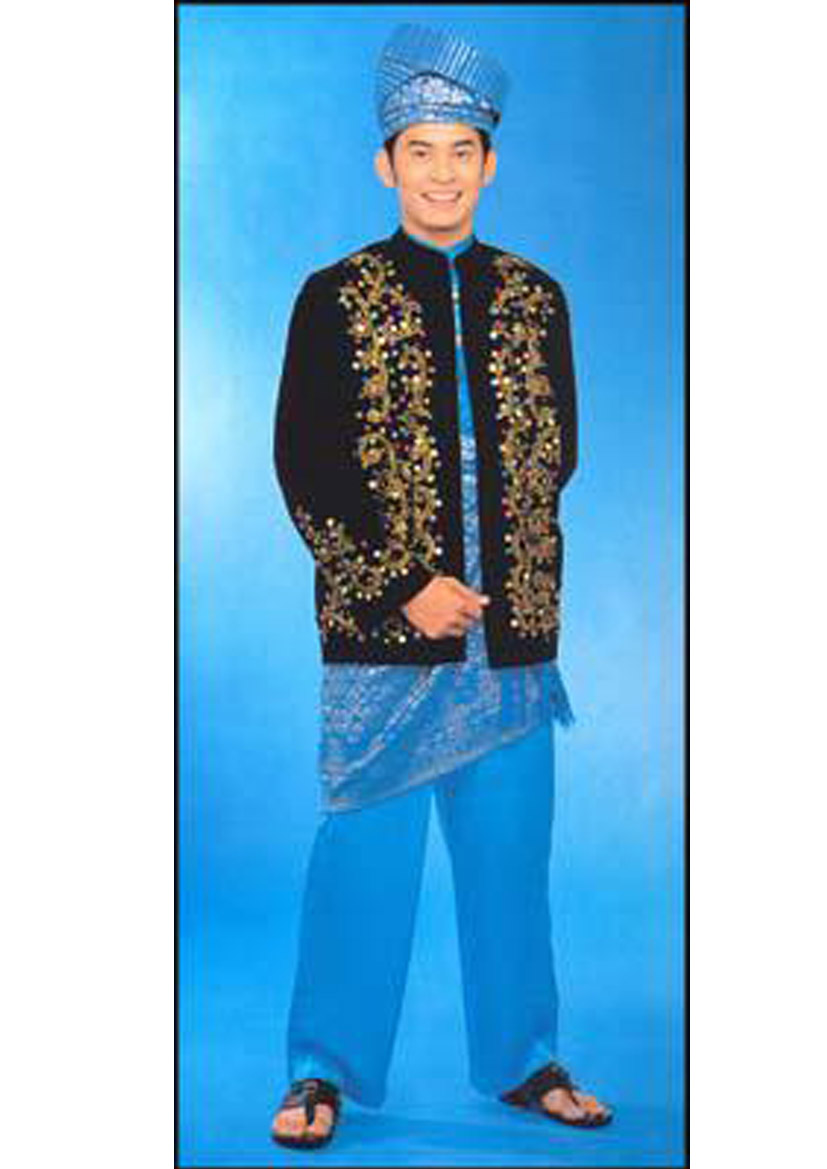
Imagine a garment that whispers tales of tradition, heritage, and timeless elegance. The Baju Melayu, the traditional Malay attire for men, embodies all of this and more. This iconic ensemble represents a cultural touchstone, a symbol of identity and pride for men across Malaysia and beyond.
Stepping into a room adorned in a Baju Melayu is not just about wearing clothes; it's about embodying a legacy. It's a subtle statement of respect for customs passed down through generations. This article delves into the captivating world of the Baju Melayu, exploring its history, variations, and enduring significance in contemporary Malaysian society.
The Baju Melayu comprises a loose-fitting tunic, typically long-sleeved, paired with trousers. The ensemble is often completed with a samping, a cloth wrapped around the waist. The variations in fabric, color, and embellishments reflect the diverse cultural influences within Malaysia, offering a glimpse into the rich tapestry of its heritage.
Understanding the nuances of the Baju Melayu goes beyond appreciating its aesthetic appeal. It's about recognizing its role in shaping cultural identity and fostering a sense of belonging. From formal occasions to everyday wear, the Baju Melayu continues to hold a special place in the hearts of Malay men.
The origins of the Baju Melayu can be traced back centuries, evolving from various regional influences. Its evolution reflects the historical trajectory of the Malay world, absorbing elements from different cultures while retaining its distinct identity. The Baju Melayu has become synonymous with celebrations, ceremonies, and formal events, solidifying its status as a symbol of cultural pride.
The Baju Melayu is more than just clothing; it represents a tangible connection to the past. It serves as a reminder of shared heritage and a symbol of unity. Maintaining the tradition of wearing the Baju Melayu is essential for preserving cultural identity and passing down these customs to future generations.
Different styles of Baju Melayu exist, including the Baju Melayu Teluk Belanga, Baju Melayu Cekak Musang, and Baju Melayu Johor. Each variation possesses unique characteristics, reflecting regional preferences and historical influences. Choosing the right style often depends on the occasion and personal preference.
Wearing a Baju Melayu correctly involves understanding the proper way to fold the samping and accessorize with appropriate footwear. Attention to detail is key to presenting a polished and respectful appearance. A well-maintained and properly worn Baju Melayu reflects a deep appreciation for tradition.
One of the main issues surrounding Baju Melayu attire is maintaining its relevance in a modern context. Balancing tradition with contemporary fashion trends can be a challenge, but it is crucial for ensuring the continued appreciation of this cultural garment.
The Baju Melayu offers several benefits. Firstly, it promotes cultural preservation by ensuring the continuation of traditional attire. Secondly, it fosters a sense of unity and belonging among Malay men. Thirdly, wearing a Baju Melayu can boost self-confidence and pride in one's heritage.
Advantages and Disadvantages of Wearing a Baju Melayu
| Advantages | Disadvantages |
|---|---|
| Represents cultural heritage and identity | Can be expensive, especially for high-quality fabrics |
| Suitable for various formal occasions | Requires specific care and maintenance |
| Promotes a sense of unity and belonging | Might not be suitable for all climates or activities |
Frequently Asked Questions about the Baju Melayu:
1. What is the significance of the samping? The samping is a crucial element, adding elegance and completing the traditional look.
2. What type of fabric is typically used? Common fabrics include silk, cotton, and linen.
3. Can I wear a Baju Melayu to a wedding? Absolutely, it's a common and appropriate choice for weddings and other celebrations.
4. Where can I purchase a Baju Melayu? They can be found in various clothing stores and online retailers specializing in traditional Malay attire.
5. How do I care for my Baju Melayu? Proper care involves gentle washing and careful ironing to maintain its appearance.
6. What shoes should I wear with a Baju Melayu? Traditional sandals or loafers complement the attire well.
7. Are there different styles for different occasions? Yes, the style and fabric choice often depend on the formality of the occasion.
8. What is the significance of the songkok? The songkok is a traditional headwear often worn with the Baju Melayu, further enhancing the traditional look.
Tips for wearing a Baju Melayu: Choose a comfortable fit, select the appropriate color and fabric for the occasion, and ensure the samping is neatly folded. Pay attention to accessories like the songkok and shoes.
In conclusion, the Baju Melayu stands as a powerful symbol of Malaysian culture and heritage. Its enduring popularity speaks volumes about its timeless appeal and the pride it instills in those who wear it. From formal ceremonies to everyday life, the Baju Melayu continues to represent a connection to the past and a celebration of cultural identity. Embracing this traditional attire is not just about wearing clothes; it's about honoring tradition, preserving cultural values, and expressing a deep appreciation for the rich history it represents. By understanding its significance and continuing to wear it with pride, we ensure that the legacy of the Baju Melayu lives on for generations to come. Explore the world of Baju Melayu and embrace the elegance of this cherished tradition.
Transform your porch with the perfect paint colors
Unlocking moms untapped system novel potential
Decoding the vw jetta navigating parts diagrams for diy success












